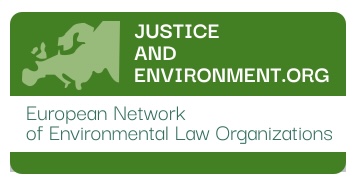IVF [closed]
Visegrad 4 Aarhus Center

GENERAL INFORMATION ON ACCESS TO JUSTICE IN ENVIRONMENTAL MATTERS IN HUNGARIAN, POLISH AND SLOVAK LANGUAGES
EU environmental policy is one of the most advanced in the world. Yet the EU has not legislated on access to justice (AtoJ) to challenge all infringements of environmental laws, as provided in Art. 9(3) of the Aarhus Convention. The issue is important for impacts on environmental protection and means to ensure accountability and good governance. The Applicant and its partners are beneficiaries of a project funded by the EU aiming at enhancing access to environmental justice in 8 selected Member States. This project includes: – Analysis of the main laws enabling AtoJ – Development and dissemination of awareness-raising materials for judiciary, bodies responsible for administration of justice, public administrations, public interest lawyers – Preparation and delivery of trainings on AtoJ.
The mission of J&E is to strive to improve EU environmental legislation and its implementation for the benefit of environment and people across Europe. This project fulfills the mission of J&E by allowing closer coordination and cooperation in a key area, access to environmental justice in the V4 region. This project will help maintain the Visegrad 4 Aarhus Center established by J&E and its V4 members by the funding from the International Visegrad Fund. Regional cooperation is key to the functioning of the applicant, being a network of public interest environmental law NGOs. Cooperation in the V4 region is even more crucial, given that the core (founding) NGOs of the applicant are from the V4 countries and still the most active members are from this geographical subregion of Europe.
The year 2018 is a special one in the life of the Aarhus family. We celebrate the 20th anniversary of the signing of the Convention, or as we say, its 20th Birthday. Countries parties to the Convention also celebrate this important date, e.g. in Hungary, the Deputy Ombudsman for Future Generations initiated a cooperation with J&E’s Hungarian member organization EMLA to hold a joint session on the achievements of the Aarhus Convention in Hungary.
This date also served as a good occasion to hold the Hungarian workshop of the V4 Aarhus Center project (back-to-back with the first Hungarian training in the EARL project (www.clientearth.org/access-justice-greener-europe/)).
The meeting was held on 21 November and approximately 50 persons attended it, mainly coming from the regional environmental competent authorities all across the country, but the judiciary, the academia and the civil sector were also represented.
Read more about the event here:
The first volume of the Newsletter of the project is available online in English.
The barriers and challenges related to access to justice in environmental matters were the subjects of a seminar organized by ClientEarth in the last week of January in the Office of the Ombudsman in Warsaw. It was the first training undertaken within the project “Access to justice for a greener Europe” in Poland.
“The issue of providing citizens with access to courts has been the most underrated part of the Aarhus Convention for years,” said Dr Jerzy Jendrośka, a member of the Aarhus Convention Committee, during the first part of the meeting devoted to international standards in the field of access to justice in environmental matters. He stated that it is one of the main challenges which all Member States of the European Union are facing nowadays.
The voice of Dr Hanna Machińska, Deputy Commissioner for Human Rights, was slightly more optimistic. In her view, the Aarhus Convention became part of European Union law thanks to the CJEU rulings regarding the application of the Convention’s provisions. She also emphasized that the Aarhus Convention, through the rulings of the CJEU, affects domestic law.
The speakers in the second part focused mainly on identifying barriers to access to justice in environmental matters.
Legal advisor Agnieszka Warso-Buchanan presented barriers to access to courts on the basis of limited possibilities to challenge legal acts regulating air quality issues in the Visegrad Group countries as well as in Bulgaria and Romania.
The meeting initiated a series of eight training sessions on access to courts in matters related to environmental protection.
Read more about the event here:
https://www.pl.clientearth.org/pierwsze-warsztaty-na-temat-dostepu-do-sadow-za-nami/
The public toolkit on the conditions of legal standing in environmental matters is available in English on the website of Justice & Environment. The respective national language toolkits are available on the websites of the project partners:
On February 28, 2019, VIA IURIS carried out the first of a series of training sessions that are planned for the judges of administrative colleges of Regional Courts in Slovakia in 2019. This first training took place at the Regional Court of Žilina. Apart from lawyers from VIA IURIS (Imrich Vozár), we were glad to receive as a speaker the Czech judge Mgr. Bc. Aleš Roztočil LL.M. from the Supreme Administrative Court of the Czech Republic. The seminar focused predominantly on the new Administrative Court Procedural Code which enshrines very broad rights of the public to access the justice system in environmental matters and implements nearly the whole 3rd pillar of the Aarhus Convention. The seminar proved that it is very necessary and even appreciated by judges to have educational activities in this topic and discuss the numerous questions the new procedure code brings up.
Take a look at the photos of the seminar here

Czechia
Link to case study (in Czech, with an English summary)
The project is co-financed by the Goverments of Czechia, Hungary, Poland and Slovakia through Visegrad Grants from International Visegrad Fund. The mission of the fund is to advance ideas for sustainable regional cooperation in Central Europe.
Odkaz na případovou studii (česky, s anglickým souhrnem)
Projekt je spolufinancován vládou České republiky, Maďarska, Polska a Slovenska prostřednictvím Visegrádských grantů z Mezinárodního visegrádského fondu. Posláním fondu je prosazovat myšlenky udržitelné regionální spolupráce ve střední Evropě.
Poland
Link to case study (in Polish, with an English summary)
The project is co-financed by the Goverments of Czechia, Hungary, Poland and Slovakia through Visegrad Grants from International Visegrad Fund. The mission of the fund is to advance ideas for sustainable regional cooperation in Central Europe.
Link do analizy sprawy (w języku polskim, ze streszczeniem w języku angielskim)
Projekt jest współfinansowany przez rządy Czech, Polski, Słowacji i Węgier z grantu Wyszehradzkiego w ramach Międzynarodowego Funduszu Wyszehradzkiego. Celem funduszu jest rozwój zrównoważonej współpracy regionalnej w Europie Środkowej.
Slovakia
Link to case study (in Slovakian)
Link to case study (in Slovakian, with an English summary)
The project is co-financed by the Goverments of Czechia, Hungary, Poland and Slovakia through Visegrad Grants from International Visegrad Fund. The mission of the fund is to advance ideas for sustainable regional cooperation in Central Europe.
Odkaz na prípadovú štúdiu (v slovenskom jazyku)
Odkaz na prípadovú štúdiu (v slovenskom jazyku s anglickým zhrnutím)
Projekt je spolufinancovaný vládami Českej, Maďarskej, Poľskej a Slovenskej republiky prostredníctvom vyšehradských grantov z Medzinárodného vyšehradského fondu. Poslaním fondu je podporiť myšlienky udržateľnej regionálnej spolupráce v strednej Európe.
We thank the International Visegrad Fund for its trust and support in this project.
Partners of the project were:
Contact person
Csaba Kiss
info@justiceandenvironment.org
Phone +36 1 322 8462




